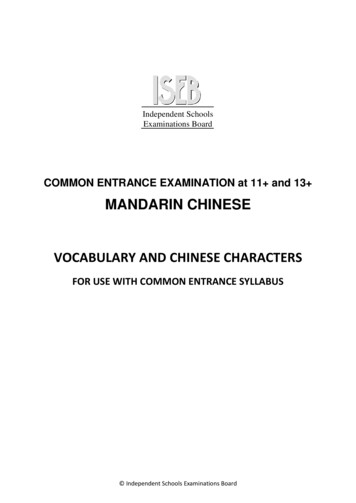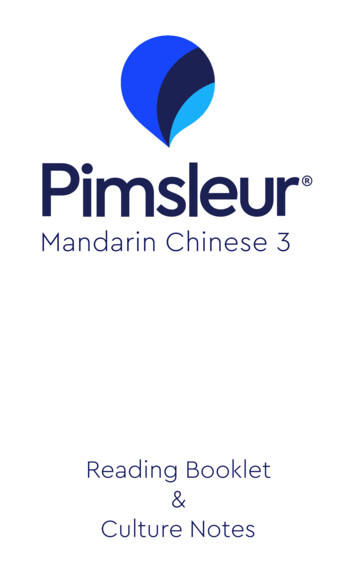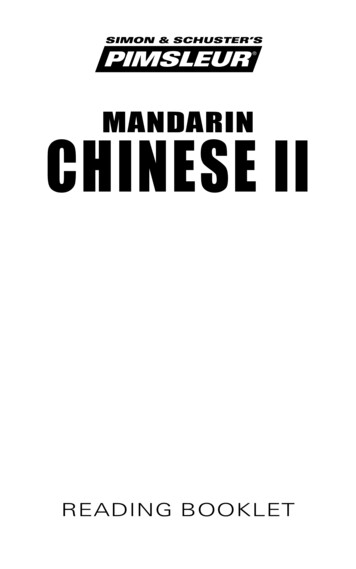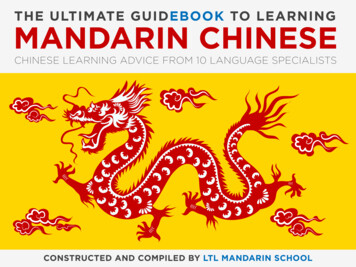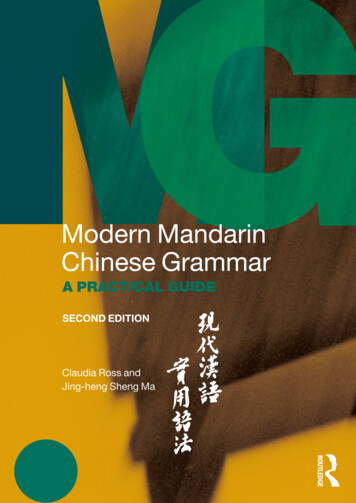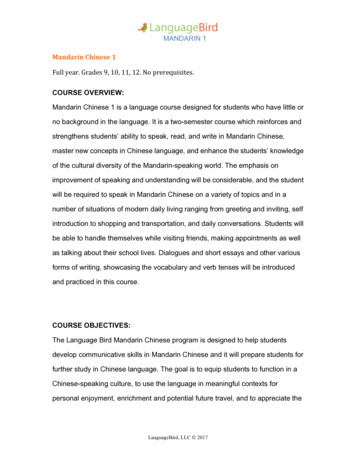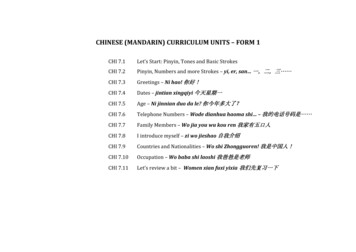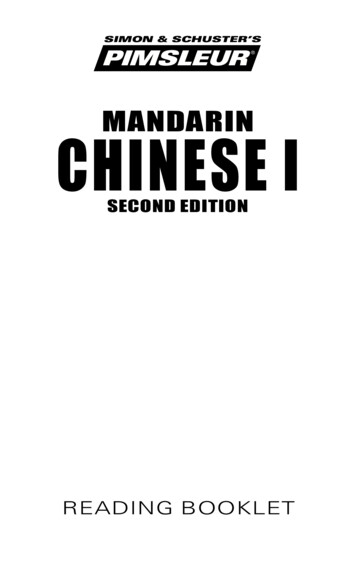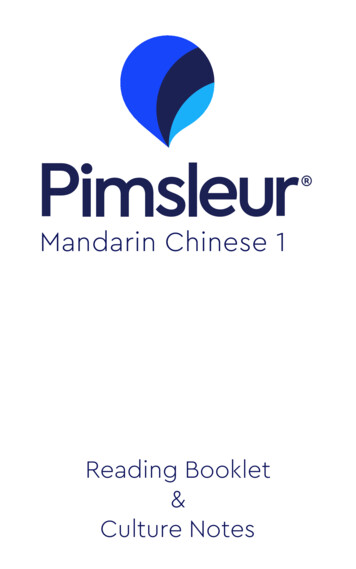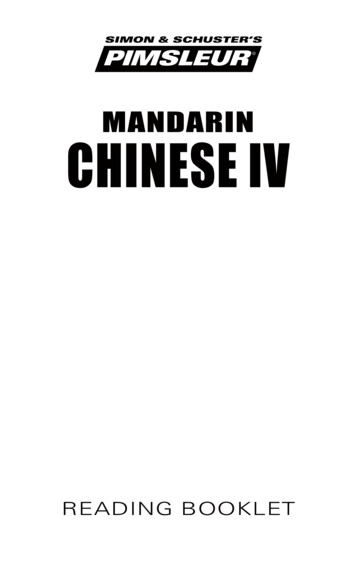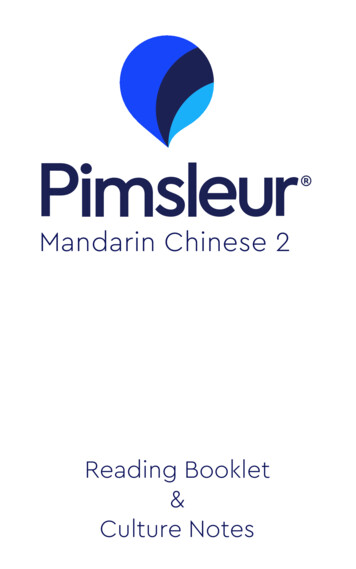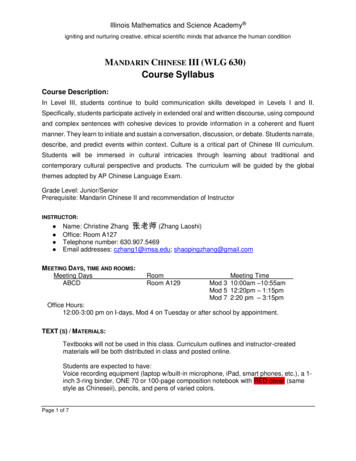
Transcription
Illinois Mathematics and Science Academy igniting and nurturing creative, ethical scientific minds that advance the human conditionMANDARIN CHINESE III (WLG 630)Course SyllabusCourse Description:In Level III, students continue to build communication skills developed in Levels I and II.Specifically, students participate actively in extended oral and written discourse, using compoundand complex sentences with cohesive devices to provide information in a coherent and fluentmanner. They learn to initiate and sustain a conversation, discussion, or debate. Students narrate,describe, and predict events within context. Culture is a critical part of Chinese III curriculum.Students will be immersed in cultural intricacies through learning about traditional andcontemporary cultural perspective and products. The curriculum will be guided by the globalthemes adopted by AP Chinese Language Exam.Grade Level: Junior/SeniorPrerequisite: Mandarin Chinese II and recommendation of InstructorINSTRUCTOR: Name: Christine Zhang 张老师 (Zhang Laoshi)Office: Room A127Telephone number: 630.907.5469Email addresses: czhang1@imsa.edu; shaopingzhang@gmail.comMEETING DAYS, TIME AND ROOMS:Meeting DaysABCDRoomRoom A129Meeting TimeMod 3 10:00am –10:55amMod 5 12:20pm – 1:15pmMod 7 2:20 pm – 3:15pmOffice Hours:12:00-3:00 pm on I-days, Mod 4 on Tuesday or after school by appointment.TEXT (S) / MATERIALS:Textbooks will not be used in this class. Curriculum outlines and instructor-createdmaterials will be both distributed in class and posted online.Students are expected to have:Voice recording equipment (laptop w/built-in microphone, iPad, smart phones, etc.), a 1inch 3-ring binder, ONE 70 or 100-page composition notebook with RED cover (samestyle as Chineseii), pencils, and pens of varied colors.Page 1 of 7
Illinois Mathematics and Science Academy igniting and nurturing creative, ethical scientific minds that advance the human conditionWorld Language Expectations for End of 3nd Year Mandarin Chinese StudentsACTFLProficiency LevelPower SchoolGradeExceedsExpectationsMeets ExpectationsDoes Not MeetExpectationsIntermediate MidIntermediate LowNovice HighA/A-B /B/B-C /C/C-/DGradingType# of Assignmentsper QuarterTotal %ParticipationIn-class participations in both individual andgroup task-based activities, headline newsNA10FormativeHomework assignments, quizzes, andTingxies (character dictation), in-class taskbased activities10-1520Interpretive: listening and reading assessments1-2SummativePresentational: oral presentation, skit, textmessages, short essays, story narrationInterpersonal: simulated conversations,discussions, interviews, email correspondenceand Wechat posting.Integrated Performance Assessment (IPA):combination of 3 communicative modes1-21-2701Cut-off values for grades:A92.5A90B 87.5B82.5B80C 77.5C72.5C70Essential Content:In this course, students will be exposed to authentic material such as podcasts, movies and shortfilms. They will continue to learn colloquial expressions used in modern Mandarin speaking world.Students will also have opportunities to compare their own culture with Chinese culture throughreading short stories and fables. Major Chinese holidays and festivals will be incorporated intoPage 2 of 7
Illinois Mathematics and Science Academy igniting and nurturing creative, ethical scientific minds that advance the human conditionthe curriculum. Students will compare and replicate classical and modern Chinese as a spokenart form to develop an appreciation of the Chinese culture and language. Level III topics mayinclude College and Career Planning, Friendship and Love, The Art and Etiquette of ChineseFood, Studying Chinese, Holidays & Celebrations, Family Structure, and Travel & Tourism.Sequence of Topics and ActivitiesLevel III Mandarin Chinese will be structured into larger thematic units consisting of several smalltopics will be introduced. Culture is not a separate unit to be studied in isolation. Rather it will bestudied and discussed throughout the academic year as it relates to other units.College and Career Planning 专业规划: students are to describe their college planning processand express and defend their college/career of choice. Essential Questions: What profession doI plan to pursue in the future? How do I choose colleges?Holidays and Celebrations 中国节庆: learning the practices and perspectives of the majorholidays and festivals celebrated in the Chinese speaking world, understanding the concept ofculture through comparisons with their own culture. Essential Questions: How have the customsand traditions of Chinese New Year evolved? How do Chinese New Year wishes and US NewYear resolutions differ?Friendship and Love 爱情和友情: describing your emotions, making aware of and explainingyour emotional needs to your friends and applying effective communication strategies to handlefriendship troubles.Essential Questions: What does it mean to be a good friend? How to handletouchy friendship troubles with finesse? How is the nature of dating relationship in China different?Family Structure 大 家 族 : talking about family immigration history, race, country of origin,languages spoken, profession, marriage status, highest education, etc., Describing the familystructure, traditions, and value systems in their own family, discussing traditional and modernfamilies, comparing the different family values and customs in one’s own culture and others.Essential Questions: Who are in my big family? What is the immigration history of my family? Whydo I have to know? How do we celebrate as a family?Travel and Tourism 旅行和旅游: learning key historic sites and attractions in China and Taiwan,planning for a class trip to China and making a detail itinerary, role playing situations at the airport,Page 3 of 7
Illinois Mathematics and Science Academy igniting and nurturing creative, ethical scientific minds that advance the human conditiona hotel, a subway station, in a taxi, or in a shop. Essential Questions: Why do we travel to anothercountry? How do means of transportation change the modern life in China? How do we plan asuccessful trip?Health 健康:describing symptoms of common illnesses, making suggestions about getting welland seek medical assistance; interpreting medical product and medication instructions, reportingmedical emergencies or needs, talking about the target culture’s views and uses of herbal cures,home remedies, and/or superstition in health care. Essential Questions: How do I communicatemy health or state of being to others? What do people in the US vs. other cultures do when theydo not feel well? How does traditional Chinese medicine differ from western medicine?Instructional Design and Approach:World Languages teachers establish an immersion classroom where the goal is communicationin the target language with correct, uninhibited, and creative expressions. "Communication"includes speaking, reading, listening, and writing. We denote, and help students to develop skillsin, three modes of communication: presentational, interpersonal, and interpretive. Ourinstructional design provides the opportunity for students to develop core competency learnercharacteristics. We empower and enable students to discover what they personally need in orderto acquire and use a foreign language; we place responsibility on the individual student tocollaborate, utilize problem-solving skills, and critical and creative thinking. We ask students topersist through frustration, and to maintain a tolerance for ambiguity; we demand that they lookat problematic situations from various viewpoints and perspectives, and we design instruction sothat they must develop and go beyond automaticity, actively construct meaning, seek connectionsand interactions that deepen understanding, and appreciate the value of knowledge from multiplesources and perspectives. We help students develop the cultural sensitivity that is necessary toguard against miscommunication or misunderstanding. We assume that students will display themotivation, maturity, and personal responsibility necessary to participate in this sort of languageacquisition environment.Student Expectations:Students are expected to be in class daily, to be punctual and to be prepared. In our immersionbased classroom, primary emphasis is on comprehension and communication in the targetlanguage. Don’t be afraid to make mistakes. The goal is uninhibited, creative expression andcommunication in Chinese, stressing a language comprehensible to the native speaker. Inaddition, students are expected to develop a cultural sensitivity that is necessary to guard againstmiscommunication or misunderstanding.The amount of time outside of class that a student needs to spend in order to acquire proficiencyin Chinese varies from individual to individual. A reasonable expectation is 20-30 minutes (e.g.Page 4 of 7
Illinois Mathematics and Science Academy igniting and nurturing creative, ethical scientific minds that advance the human condition10-15 minutes on listening/speaking, 10-15 minutes in writing characters) per day. Shorter dailystudy sessions are much more conducive to language acquisition than one or two longer periodsduring the week. Active class participation is essential to student success and to the success ofthe course. Also students are encouraged to take advantage of the opportunities to be able topractice and reinforce what they have learned in the classroom with so many native Mandarinspeaking students on campus.Homework is assigned daily to help students achieve the identified learning targets for the level.Students are expected to complete homework assignments, but they will not be graded. Inaddition, completion of designated homework assignments will also be required prior to anystudent-initiated re-assessment.Bathroom passes: If the student absolutely needs to use one, the student is expected to requestpolitely in Chinese.The WL team follows Academy’s attendance policy. Tardiness and absences may adverselyaffect student’s learning.Although students are expected to work collaboratively both inside and outside of the class, mosthomework assignments are to be completed individually. Please refer to Student Handbook forIMSA academic dishonesty policies.Assessment Practices, Procedures, and Processes:Assessment is an ongoing process of goal setting and measuring involves both the teacher andthe student. The teacher provides regular feedback on student performance. Students incorporatethe teacher’s feedback to improve their proficiency. Students are encouraged to engage in selfassessment regularly. Emphasis is on continuous efforts to improve language proficiency insteadof completion of tactical tasks.Students are assessed daily on the production of spoken and written language, and on readingand listening comprehension. Summative assessments are held towards the conclusion of eachunit. There are two types of assessment: formative and summative. Formative assessments areused throughout instructions to provide the teacher and students with the indications of students’progress. They are given frequently to help you master the necessary skills. In general, there are20-30 formative assessments per semester. Failure to do well in one quiz will not significantlyaffect your grade. This approach was designed to allow you to take risks and learn while makingmistakes. Summative assessments are unit tests. They provide evidence on whether you haveachieved the unit objectives and targeted proficiency. There are 3 modes of assessments:interpretive, interpersonal and presentational. In each unit, you will be asked to demonstrate yourmastery in all three modes. These summative assessments assess what the students can do withlanguage in spontaneous and unrehearsed fashion in terms of speaking, writing, listening, andreading in simulated real-world situations in familiar contexts.Page 5 of 7
Illinois Mathematics and Science Academy igniting and nurturing creative, ethical scientific minds that advance the human conditionMake-up assessments are given at the discretion of the instructor. Students with unexcusedabsence will not be entitled to the privilege of make-up exams. Students who miss a test due toexcused absence should notify the instructor before exam time if at all possible. If a make-up testis appropriate, students should arrange to take a make-up exam as soon as possible within oneweek of the scheduled time of the exam.Re-assessments are available for students who receive grades less than 80% within two weeksafter the test date. There will be requirements to be fulfilled prior to the reassessments; examplesare, but not limited to, completions of homework or satisfactory results on highly relevant quizzes.In addition, missing current homework assignments will revoke students’ opportunity toreassessments. Students will receive 85% of the grade of the reassessment. The maximum gradethat students will receive for the reassessments is 85%.SSLs and Outcomes:I.A. Students are expected to demonstrate automaticity in skills, concepts, and processes thatenable complex thoughts by controlling the linguistic system (syntax, morphology, phonology, semantics, lexis) engaging in oral and written discourse using strategies that enhance the effectiveness of communication applying content knowledge to create with the target language. providing and obtaining information decoding written and spoken language on a variety of topics presenting information, concepts, and ideas to an audience of listeners or readers ona variety of topics transferring content knowledge in alternative scenarios and new problemsII. A. Students are expected to identify unexamined cultural, historical, and personal assumptionsand misconceptions that impede and skew inquiry by recognizing that language learning is not simply a word-for-word translation process,but rather the acquisition of an entirely new set of concepts processing information on the nature of language and/or cu
World Language Expectations for End of 3nd Year Mandarin Chinese Students Exceeds Expectations Meets Expectations Does Not Meet Expectations ACTFL Proficiency Level Intermediate Mid Intermediate Low Novice High Power School Grade A/A- B /B/B- C /C/C-/D Grading Type # of Assignments per Quarter Total % Participation In-class participations in both individual and group task-based activities .
